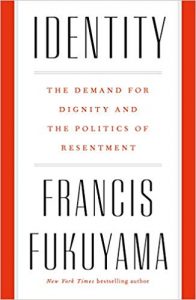Evan Goldstein in the Chronicle of Higher Education:
 Francis Fukuyama is tired of talking about the end of history. Thirty years ago, he published a wonky essay in a little-read policy journal and became an overnight intellectual sensation. His argument, that the triumph of Western-style liberal democracy marked “the end point of mankind’s ideological evolution,” remains an iconic declaration of the post-Cold War world. He’s been defending it ever since. He’s regularly asked if some event — September 11, the 2008 financial crisis, Donald Trump’s election — has invalidated his thesis. His answer is no.
Francis Fukuyama is tired of talking about the end of history. Thirty years ago, he published a wonky essay in a little-read policy journal and became an overnight intellectual sensation. His argument, that the triumph of Western-style liberal democracy marked “the end point of mankind’s ideological evolution,” remains an iconic declaration of the post-Cold War world. He’s been defending it ever since. He’s regularly asked if some event — September 11, the 2008 financial crisis, Donald Trump’s election — has invalidated his thesis. His answer is no.
As Fukuyama sees it, the confusion stems from a misreading (or a failure to read) the last few chapters of his 1992 book, The End of History and the Last Man (Free Press). It was there that he fretted about the ability of liberal democracies and market economies to satisfy the human desire for recognition. Liberal democracy can deliver peace and prosperity, but what happens if peace and prosperity aren’t enough?
It’s a question Fukuyama returns to in a new book, Identity: The Demand for Dignity and the Politics of Resentment (Farrar, Straus and Giroux). The answer, he suggests, is all around us: A global surge of identity politics, which has in turn fueled populist nationalism, authoritarianism, religious conflict, and democratic decline.
More here.
